Irete Untelu (Irete Ogbe)

Irete Untelu is the combination between the major Odu Ogbe and Irete, is the sign number 212 in the genealogical order of Ifa. It represents justice, in Ifá it advises to offer sacrifice in order to become an important person in life. The appropriation of Olofin, in the life of the Awo.
Overview of Odu Irete Ogbe (Irete Untelu)
What is born in the odu of Ifá Irete Untelu?
- Let the letter be removed at once.
- Throw 3 buches of omí and 3 of otí for the street.
- OLOFIN's Iroye, because he was losing his memory.
- OBATALA YEKU YEKU (nervous, touches mother).
- The touch of Agogó de OBATALA.
- Let husbands strangle their unfaithful wives.
- The berraco vine and the stallion vine, to avoid the impotence of the Awó of this Oddun.
- That to fire OLOFIN he buries himself in the mud of the river.
- The why choose has 21 snails (Dilogunes).
What is Irete Untelu talking about?
- The charge of vigilance (Asheilu), the politician (Awon Olopa), policeman (Oye), Ishe itoyu ilú (the vigilant or confidant).
- Do not eat guava candy.
- The great virtue and curse of the slug and why the children of OSHUN and this Oddun cannot be Oborí Eleda with Igbín.
- Do not eat cane or coconut.
- Marine phenomena, such as the sea of leva or bottom.
- The great power of Eggun and Ifá.
- The prohibition of eating Obí.
- Why in Orunmila an Ota appears as a representation of him.
- The Ewe Tete Nifa (head).
- That the rice bug creates liver problems, do not eat yellow rice.
- Put 8 coconuts to Orula so as not to separate from the godfather.
- May Elegua have a mouth, an eye and a nose.
The Oddun of Ifa Irete Ogbe notes:
- That the godfather in Atefá or Awofakán takes 5 new ikins and changes them to the godson, and puts them in his OGUN, so that he does not steal luck and Aleyos.
- That Olokun on Earth is represented in an Akere clay jar.
- Why Obatala is covered with Oú, orí and efun.
- Do not kill ants.
- The scourge of the Iyoyé.
- The Slug, when counting his children, saw that he was missing one
- It is said ADIFAFUN IGBAÑI.
- This is Irenlu (The Rape).
- ORUNMILA has 16 Igbín inside, 8 in each hand.
- The Awó cleans the Ilé when the Aleyo Umbo with ekó, ewé Tete, ewé dun dun, oú.
- They raised their hand to ORUNMILA.
- OLUOPOPO created smallpox.
- ABITA created Adam and OBATALA eyelé her.
- The land of OBATALA was lost by the Otí.
- The shadow of ORUN speaks, protecting it.
- OYA had a son with ORULA, a protégé of ORUN.
- The hutía was constantly watched by her husband.
- OLOFIN's Obiní could not give birth.
- The diseases are: intestinal phthisis (intestinal tuberculosis), diatal hernia, diabetes, liver cirrhosis, prostate,
- impotence, laryngitis, pharyngitis (carcinoma), hemorrhoids.
- They wanted to kill the prodigious because it unites.
- The Eweses are: Flowery or well-dressed pinion, acacia, which is the pinion of roses or French Paradise.
- The bee gets the stinger for EBO.
- He speaks well or badly, he puts ekó, heyá, epó on ELEGBA and cleans himself with an akukó.
You can read: Sign of Ifa Ogbe Ate
Analysis and Reflection of the Ifa sign Irete Untelu
Irete Untelu warns about the dangers of recklessness and lack of consideration for others and our own actions. This Odu emphasizes the importance of moderation and caution in all aspects of life, especially in decisions and actions that can have far-reaching consequences. Justice and legal problems are recurring themes in this sign, suggesting that thoughtless or malicious actions will eventually find their way back to us.
Economic Aspects
Economically, Irete Untelu emphasizes the importance of caution and prudent management of resources. The warning against borrowing money highlights the risks of debt and financial complications. This Odu teaches us that economic stability is achieved through responsibility and avoiding financial commitments that can become burdens.
"Salud"
Irete Untelu also focuses on health, emphasizing the care of the nervous system and the need to avoid stress and anxiety, metaphorically represented by the "nervousness" associated with Obatala Yeku Yeku. Dietary recommendations and specific prohibitions seek to preserve physical well-being, warning about the dangers of ignoring the body's signals and the advice of ancestral wisdom.
Religious Aspects
In the spiritual realm, this Odu emphasizes the importance of the connection with the Orishas and the fulfillment of the Ebo (sacrifices) to maintain divine protection and balance in our lives. The narrative of Irete Untelu highlights the need to purify our environment and our spiritual practices, reminding us that faith and correct actions are essential to attract Ire (well-being) and avoid Osobo (misfortune).
Personal Relationships (Love)
Regarding personal relationships, Irete Untelu warns us about the consequences of impulsive actions and infidelity, symbolized by the dramatic consequences faced by siblings who disobey warnings. This Odu teaches about the importance of fidelity, respect and prudence in our relationships, highlighting that dishonorable actions not only affect us individually but can also have a devastating impact on those around us.
Meaning of the oddun Irete Untelu:
Irete Untelu says: "If you teach intelligence to any person, His intelligence will be intelligent." "But, if you teach stupid things, His stupid things will be stupid."
It is an Ifa sign that marks backwardness for the Awó. The person who comes to look at himself does not suit him, because he brings him justice and problems.
When this Ifá is seen, a solution is made with husk and brandy (efún and otí), and with it the Oddun Irete Ogbe is painted on a chicken egg (eñí adié), placed in a glass with honey, covered with a plate and turn the glass upside down. Thus he is placed behind the door and Ogbe Tua remains in the egg.
Do not eat spicy, or salty, or foods loaded with condiments, or sausages, or enchilados because you suffer or will suffer from hemorrhoids.
Oddun of scarcity, there was no food in the world, no clothes, no medicine. The earth cracked and Olodumare, with his wisdom, fixed everything.
He does not step on ashes, or blood, the person who comes to look at himself does not suit him in the house, he will bring him justice.
The man has coagulated secretions in the prostate and when ingesting alcoholic beverages they stir and begin to expand throughout the body, causing serious consequences.
The letter Irete Untelu retires immediately, if it comes as bad, after the aleyo retires, the Awó cleans his body with a big cock, he wonders if he takes EBO and, if he does, he lies in the corner, because they are casting Witchcraft (Ogú).
Whoever looks at it has to make EBO with hen, chicken or chicks.
Mark desbarate or prison within 7 days, take a chicken egg, 1 gourd with water, blow on the door and put the egg inside, then break it.
Mark 11 days, 11 months or 11 years in prison. For this, it is vital to do the EBO of the candle.
Irete Untelu in Ire:
EGUN is given a table with cutlery and tablecloth.
It is sung: «EYENI UN WEMILE ESE IWERE ALUARAN LONA ONA ONA AWO MIRIN OMO WE MIRIN A IKU».
It says that the cundeamor was put in the Ifá and it is put in any case so that it is saved.
The owner of this Ifá spits a lot and has a scratchy throat, caused by pharyngitis, laryngitis, colds, in smokers and drinkers. Multiple papilloma, carcinoma, and vocal cord nodules also occur.
The Odu explains that, no matter how great the godson is, he is always obliged to give MOFORIBALE to his Godfather.
There is usually occlusion of the nostrils. Patients may die from cachexia or aspiration pneumonia. To avoid this, Omiero is prepared with ewé eyení and honey, puts OSHUN inside the pot and drinks a glass daily. Ifa of Abiku.
To work through this sign, all the necessary Odu are marked, but they cannot be missing: Irete Kutan, Ogunda Meji, Ojuani Meji, Ojuani Shobe, Otrupon Adakoy, Otura Tiku, Otrupon Ka and Ojuani Pokon.
Irete Ogbe Osogbo:
To purify the house: It is washed with Bledo blanco, indigo, Rompe Saragüey. Then honey and flour are spread around every corner of the house.
A fourth person is not allowed in your house, due to the disturbances that are created.
It is fed to the 4 corners of the house.
Red tape to neutralize an EGUN that is opposed between you and your spouse (behind the head of the bed).
The wasp, created by OLUOPOPO and that came out of the wild cane, made OBATALA and ABITA flee, who cursed it.
The stability of the person is governed by OLOFIN and reaffirms it as an ORUNMILA judge.
Do Ifá.
Take Ateje root for intestinal consumption.
Advice from the Oddun of Ifa Irete Ogbe:
- Ifá marks marine phenomena and penetrations of the sea.
- Orunmila's son was lost in this Ifá.
- Always keep what you promise so that it has a good ending. Several people will die because of you and, in the end, you will also die.
- He is a righteous Odu, that is why where the Odu comes out to do good, there is justice.
- When this Ifá comes out and does not favor the one who deserves justice, it does wrong.
- It is also used to gain the indulgence of justice and to run over the one who demands and deserves justice.
- When you give it the hand of ORUNMILA, it is only made with 7 herbs.
- 16 Ikines are put on and 6 Awoses are invited and the one who is going to receive the hand of Ifá, breaks 7 herbs.
- When the hand of Ifá is going to be handed over to the person who receives this Ifá, the ceremony is performed with the least amount of Awoses and herbs, and only 16 Ikines are given, because that person can bring justice and discover the secret. The other three Ikinis will serve for if the person betrays, they are given to OGUN.
- Avoid dealing with investors, if the person is young, he may have inclinations.
- You cannot drink alcoholic beverages.
- The mother destroys the daughter, pretending to do good from the point of view of love. The mother must receive Ikofafun to achieve tranquility.
- It is an Ifá of Abikú. Childhood is sad, humble, a slave, goes hungry and needs and is saved by the Saint.
- In this Ifá, a chain with 7 akofá is put from OSHOSI to OGUN. In addition, a small metal Oshosi is used washed and eaten with OBATALA on top, so that the police do not bother you any more.
You can read: Treaty of the Odu of Ifa Irete Meyi
Sayings of Irete Untelu:

- You cannot catch the trail of salt in the water nor can you find the trail of deer footprints on the stone hills.
- The tongue lost its head.
- There is no language that speaks that God did not punish.
- As long as food is not cooked, it is not taken off the heat to eat.
- The working man is seldom needy.
- The man who can do better than what he does and does not do, is the greatest of lazy.
- The comadre bought a new broom.
The saying "There is no tongue that speaks that God did not punish» teaches us about prudence in our words. He warns that reckless or harmful expressions are not without consequences. This proverb invites us to meditate on the impact of our speech, reminding us that discretion and wisdom in our words are essential virtues to avoid divine disfavor.
Ifa ethical code of the odu Irete Untelu:
- No matter how exalted the Awó may be, he must always render moforibale to his godfather and his Oyugbona and his elders in general.
Eshu Irete Untelu (Ogbe):
Eshu OGOGO.
Load: Shells or slug shell, many beads, 16 peonies, chicken and pigeon eggs, chameleon head, fish, dry wine, many bugs, 21 strong sticks, small fish, jutía and smoked fish, corojo butter, 3 hee hee, 3 whole macaos, 3 whole slugs, limes of all kinds. It is assembled with the head, legs, and heart of a quiquirikí rooster.
If you give him a puppy, much better. In the sticks they should not be missing: moruro, loses course, ayúa, guao, etc.
This ELEGBA washes and consecrates itself. He also lives alone and is never sprayed with brandy in the morning. When he is given blood, dry wine is sprayed on him and, when talking to him, swish of water is sprayed on him. It is lit in the morning with lamps. He lives on the ground of the cemetery and when he goes to eat, he does so on it.
Eat 3 chickens, a small rooster (quiquirikí) and a pigeon from time to time. You always have to take something to the corner.
Says Ifa odu Irete Untelu
Don't do favors. KAFEREFUN OBATALA, SHANGO and OLOFIN. He has 3 very powerful enemies, one of them is chasing him, be careful not to get disoriented in the house, there are problems in the couple and the man can raise his hand. Something is thrown at the door for the person. Feed the dead father a sheep so that he can free him from all the bad things that come to him. Beware of traffic accidents, because here the Moorish horse ran wild. Avoid fighting at home for 7 days. They are three brothers and the person is the youngest and the one who takes care of his mother the most. He is very proud, respect the elders. Something bad is going to enter your house out of envy. Be careful with stolen things, the thief appears. Take care of SHANGO and OSHOSI, OSHUN supports you. Do not drink alcoholic beverages. Don't take anything they give you to keep. They will give you false testimonies and for you many men will die and then you will also die. Whoever comes to look at himself must bring a broody hen and if he has chickens, too. He has enough money and within 3 months what Ifá says will turn out. You are arguing with someone else for women and the father of the girl who is in love with you. Have money. If you insist on your wife, you lose. Sometimes he offers a lot and gives nothing. There is an EGUN that stands between the person and their spouse and that is why the disorders. Beware of smallpox. You can make a pilgrimage by curse of the Saints or someone. He eats and is not full and people say that he knows so much why he is so poor. He agrees to ORUNMILA. Wear a flag necklace. Avoid excesses at parties and love affairs. Apparent happiness has been bought with pride and vanity. Take good care of your work and love relationships so that you have profit and prosperity. Complete and do everything that ORULA sends you. Do not leave strangers in your house. Maids should not sleep in underclothes at home because you can lose your brain and commit an outrage. His Ilé is ruled by OBATALA. Feed the 4 corners for the EGUNs in your house. Sometimes you smell a pig pen in your house. Be careful with gifts of fruits or cigars with Ogú.
A probable relationship will bring a profit, increase, or interest, depending on the intensity of that relationship.
Ifa Irete Untelu says: people want to embarrass him and everything is out of envy. You eat and don't fill up and people say that if you know so much, why are you so poor. You have to settle ORUNMILA with precision, so that it can save itself from the hands of its enemies. You have many opponents and people who envy you
He is fed to the four corners of the house, so that he can live in it, since there are people who bustle with the dead. There is an EGUN that stands between you and your spouse, and that is why you suffer from disorders, difficulties, etc. Place a red ribbon behind the head of your bed to neutralize this influence.
Prayer of the Odu Irete Untelu:
Irete Intemebole Abiri Kolo Omolubo Abata Ati Kotopo Omolubo Owara Yaniye Omolubo Meta Laba Pari Ati Meta Laba Meri Lodafun Igba Ni, Lodafun Inniye.
Dream:
ONI AWA AGBA LAYO INSHEGBO TETE MERIN TETE MOÑA
ONI AWA EYORUN LAYO ENSHEODAN TETE MERIN TETE MOÑA
AWA KEKE LAYO INSHE OYO AYAKA TETE MERIN TETE MOÑA.
Irete Untelu's Ebbo:
Work to YEMAYA, to solve something difficult:
A yucca bush is pulled up and 9-colored threads are chalked inward at the main root. It is put to YEMAYA.
Ebbo Irete Ogbe to get someone out of the house:
A little salt is put on the board and with a chicken egg, the sign is broken, placed on the board and in the egg, asking the person to get everything right. You take an igba and add the salt that is on the board and carefully take the chicken egg, with the name of the person written in pencil, and add a little omí in the igba. She stands at the foot of ELEGBA and SHANGO, saying: Salt never leaves a trace, so neither does John Doe leave a trace.
Irete Ogbe's work to solve problems with OSHUN:
Add to OSHUN and cook it without opening it or cleaning it. Then they dance and are taken to the river.
Inshé Osanyin of Irete Untelu to avoid the police.
Yagruma, mouse, 7 chameleons, 21 guinea pepper, yellow scent, white and blue celestine grass, French purslane, sea sage, bat. However, they do afoshé so that the police do not come to the house.
Learn: All about Shango, the Orisha of Fire.
Patakie of the Irete Untelu sign:
The three brothers, only Shakuata was saved.
In a house lived three brothers dedicated to debauchery and disobedience towards their elders, which led them to become ill. The youngest, Shakuata, attended one day an Osha Tambor party, where he received advice from Shango and Oshun. They recommended that he consult Orunmila, who revealed his Ifá to him: Irete Bamore, explaining the root of his problems and marking him an Ebo. In addition, she warned him not to host a fourth person in his home to avoid misfortune. Shakuata complied with the Ebo and warned his brothers not to give shelter to anyone else. However, in his absence, his siblings ignored his advice and took in someone else, causing disturbances in the home. Upon returning with Orunmila and Ifá, Shakuata found that there were four residents. After performing rituals in honor of Oshun, the eldest brother died, the second was paralyzed, and only Shakuata, protected by his faith and actions, was saved. The cause of the trouble was expelled, and Shakuata devoted himself to his religious practice.
Explanation: This story teaches the importance of obedience to spiritual warnings and advice, as well as the consequences of ignoring them. It shows that respect for traditions and prudence in our actions can protect us from adversity, while negligence and disobedience can lead us to ruin. Shakuata, by faithfully following the instructions received, managed to safeguard his well-being, highlighting the value of faith and individual responsibility in each person's destiny.
Irete Untelu Ifa Traditional Nigerian:
IRETÈ OGBE
Àtègbè Awo Olokun
Lo day fun Olokun
Níjó tí omi Olókun ò toó fi bójú
Òun la ojà ha?
Òun yes nipon kárí ayé?
Wón ní kó rbo
Wón ní yóó túbi láyé
Yoó gba gbogbo ilè lo
Wón ní kó ru òpòlopò emó
Nígba nígba ní kó sì rbo è
Atègbè Awo Olósà
Ló día fun Olósà
Níjó tí Omi Òsá ò tú sinsè
Òun náà him tobi layé báyìí?
Kóun náà or gbajú gbajá
Wón ní kí Olósà náà ó rbo
Won kebo fún won nigba nigba
Wón ní kóun náà ó ru igba emo
Òrìgí Babaláwo Atan
A day fún Atan ní kùtùkùtù òwúrò
Níjó tí omi Atan ò tú nnkan
¿Still le nípon layé?
Or give him fóun náà?
Wón ní kóun náà ó ru emo
Won kebo fún gbogboo won
Òrúnmìlà gives gbèdéke
Ó ní kótóó said kan báyìí
Kí gbogbo nnkan ebo pé
Kée lè baà lágbára
Olókun bèrè sií kó emó jo
Obìin Olókun sì n bá Olókun tún gbogbo ihun tí ó fi rbo se
Gbogbo emó ní n dáná yeah
Kó mó baá jera
olósà náà
Obìin rè náà n bá a tún nnkaan è se
Sùgbón Atan ntiè
Bó bá ti pé àwon ò rí nnkan táwon ó fi jeun njó kan
Emó ti Atan n paá jo
Obìin rè bá n lòó mú u nkòòkan
Ní n gún a mó Òrúnlá
Athan bá fura
'Òrúnlá yìí a se n dùn yàtò báyìí'?
Obìín ní bí ti n dùn nùu
Bíí tíí dùn náà nùu
Tó fi ye kí Okùnrin ó móo se dáadaa nùu
Ngbà ó said tí wón ó rbo
Olókun kó tiè Sílè
ó pè
Olósà ntiè
Òun náà kó emóo tiè Sílè
Tie ku diè ko pé
Atan ni e boun kó toun
Obìin Atán me 'n làwón n gún mó Òrúnlá'
'Òrúnlá táwon n sè un' !!!
Atan ó bá rí emó kó loòdò Òrìgí
Atan làá pe Àbàtà to dá duó
You è é sàn
Olókun bá sàn kárí ayé
Olósà sìkejì è
Atan tiì bá sèketa
Kò rémó kó loòdò Aláwo e
Ó ní Àtègbè Awo Olókun
Lo day fun Olokun
Níjó tí omi Olokun ò toó fi bójú
Wón ní kí Olókun ó sa káalè kó jàre
Ebo ni ko se
Olókun gbebo nbe
Ó rubo
Atègbè Awo Olósà
Ló día fun Olósà
Níjó tí Omi Òsá ò tú bù sinsè
Wón ní ó saca káalè ó jàre
Ebo ni kóun náà or se
Olósà gbébo nbè
Ó rubo
Òrígí Babaláwo Atan
To day fun Atan
Níjó tí omi Atan ò tú nnkan
Ó ní kí Atan náà ó rbo
Kó lè baà sàn kárí ayé
Obìnrin Atan mòmò ló wáá femó jòrúnlá
Atan ò le sàn mó or
Olókun Tobi
Olósà TV
Atan nìkan ní n be léyìn
Tí ò se nnkankan ráráárá.
Ifá advises that this person should appease his wife greatly so that she does not contribute to his failure or probably cause it. He is seen as someone who will be substantial in life but if the wife has good home manners and supports her husband, everything will be fine. Otherwise, they will go backwards instead of going forward.
Meaning:
Àtègbè is the priest of Olókun
He was the one who made divination for Olókun
The day the ocean waters weren't enough to wash your face
He asked, 'Will I become great in life?'
'And will I spread across the entire expanse of the earth?'
He was advised to offer sacrifice
They assured him that he would become very great
And it will spread everywhere
But he should offer a lot of Emó rats as a sacrifice
The rats you must euthanize are hundreds and hundreds of rats
Àtègbè is the priest of Olósà
He made divination for Olósà
The day that the waters of the lake were not enough to wash the legs
He was also assured that he would be great on earth
'Will I be very big?'
They advised Olósà to offer sacrifice
They prescribed that the articles of sacrifice must be hundreds and hundreds of them
They advised him to offer 200 Emó rats
Òrìgí is the priest of Atan
He was the one who made divination to Atan in the beginning
The day the swamp waters were nothing to write home about
He was also assured that he would become very great on earth
He asked, 'Will everything be better for me?'
They advised him that he should offer sacrifice with Emó rats
They prescribed the same sacrifice for him too
After the prescription was told to each of them
His priests then set a date for the sacrifice
All prescribed items of sacrifice should have been completed prior to the date
The priest said to them: 'So you will be a force in your own domain.' '
Olókun began to gather his rats
The ones he had gathered, his wife would take care of
She smoked rats continuously
So that they would not be damaged
Olósà too
It was his wife who took good care of his rats
But Atan's wife on the contrary
One day her husband told her that they did not have meat to make the soup
She went to find the rats that had been gathered by Atan
She started taking one at a time
She would pound the rats with Òrúnlá soup
Atan one day began to suspect
'This soup is delicious'
The woman replied 'It's her usual taste'
'The taste is the same'
This is the main reason why husbands should have good character at home.
The day the sacrifice should be made
Olókun carried all his own sacrificial items
These were complete
Olósà in your case
He also brought his Emó Rats
Only a few rats were missing to complete the ones they asked for
Atan told him to take out his rats
She replied: 'Those were the rats that I crushed in the soup Òrúnlá'
Akíntokùn, the wife of Atan
“The sweet Òrúnlá soup that we always ate '
Atan couldn't even get a single rat to use in the sacrifice
Atan is the name of all the lands that are swampy
The waters that do not flow
Olókun flows all over the world
Olósà enters as second
Atan, who could have been the third
He couldn't find even a rat for his priests
He said Àtègbè is the priest of Olókun
He was the one who made divination for Olókun
The day the ocean waters weren't enough to wash your face
They advised Olókun to take care of the land
And offer sacrifice
Olókun heard about the sacrifice
And he did
Àtègbè is the priest of Olósà
He made divination for Olósà
The day that the waters of the lake were not enough to wash the legs
He was advised to please take care of the earth
And offer sacrifice
Olósà heard about the sacrifice
And he did
Òrògí is the priest of Atan
Who made divination for Atan
The day the swamp waters were nothing to write home about
He advised Atan to offer the same sacrifice
With the goal that he could also flow through the whole world
But this was Akítókùn that crushed the rat Emó in the Òrúnlá soup
The swamp never flowed again
The ocean got very big
The Lake followed him
The Swamp was the one left behind
Since he couldn't do anything.
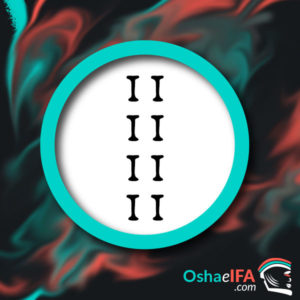
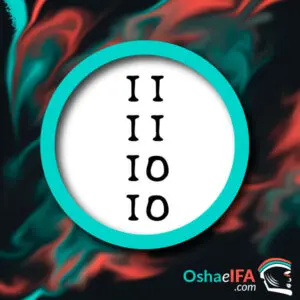


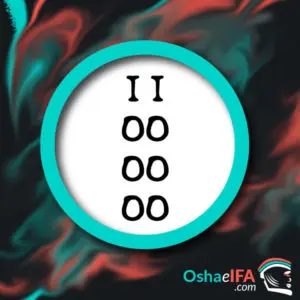

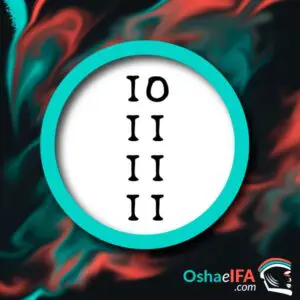
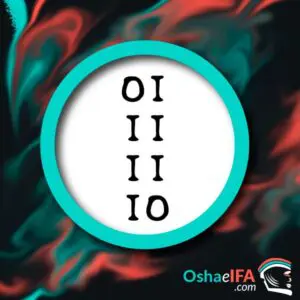
Muito bom gostei muito de ser a respeito de irete untelu
Aboru aboye abose